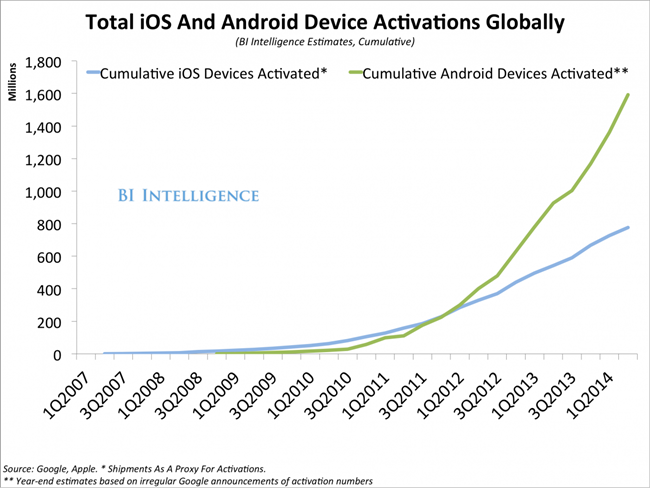Android vs. iOS – not so Android scary as they paint it
In early September, we touched on the perennial mobile conflict of Android vs. iPhone. At the time, we focused on the problem of why many of the apps available for iOS platropha, do not exist in the Android version. While Android seems to rule in USA, many American or Western European users don’t seem to fully trust the platform.
In its latest report, Business Insider proves this bias wrong.
While there is rather no problem finding a multitude of users bludgeoning Android (by the end of the year their number worldwide is expected to reach 1.2 billion), while it is common to find people working in the mobile industry complaining about the system. Marketers complain about weak advertising potential, developers about high system fragmentation… Business Insider proves that this is not the case at all. Of course, iPhones’y and iPads annually generate more profit than Android devices, but the system with the green folk has many of its strengths and advantages. Fragmented, full of bugs and “low-shelf” – these are the most common accusations leveled against Android.
Below are the arguments demystifying these allegations.
- Business models that ignore Android are hurting themselves. Industry insiders may have a lot to complain about with Android, but at the end of the day, users have the final say. The number of Android users worldwide is at least twice as large as the number of iOS users. The number of people using Android can be compared to the number of people using Facebook or Windows. Quite a few, right?
- Android is growing faster in terms of generating m-commerce traffic. In the second quarter of 2021, traffic generated by Android ads surpassed the shares of iPhones’and iPads. While the actual revenue of iOS devices is still higher, Android is twice as fast at generating traffic that can ultimately translate into pure revenue.
- Android is increasingly appreciated as a system with advertising potential. Year-on-year, the number of commercial orders for Android is increasing by 26%. In the United States, 1/5 of e-commerce orders are outsourced to this platform.
- The problem of android fragmentation is significantly exaggerated. There is constant talk about the multiplicity of Android versions, which is supposed to make developers’ work more difficult, while in fact as many as 80% of Android devices worldwide are running the latest or penultimate version of the system. In the United States, the percentage is as high as 90%.
- Google is showing increasing concern for the quality of apps available on Google Play. Apple’s App Store has always seemed more orderly and “prestigious,” but Google is increasingly looking to significantly reduce the percentage of hopeless and spammy apps in its store. Meanwhile, the Google Play store itself is earning more and more – it has doubled its revenue in a year (data from 1. 2021 quarter). This is a faster growth rate than the App Store. According to some forecasts, Google Play may overtake the App Store in the next 5 years in terms of revenue brought in.
- Google is also fighting back with resource-intensive apps and system overlays, provided to Google Play by cooperating companies, primarily by smartphone manufacturers and mobile operators. Google, however, is putting more and more pressure on the companies working with them not to “litter” smartphones with their overlays and unnecessary apps, and stay true to the classic set of apps from Google. It brings results, because in the second quarter of 2021, 65% of Android phones produced had Google’s preferred version of Android, without unnecessary additions. Here you can see an improvement over last year (by 3 percentage points).
Google certainly deserves praise for its ongoing work to improve the system and the Google Play store itself. In terms of prestige and exclusivity, Android will probably still need a long time to come out of Apple’s shadow. However, this does not change the fact that, despite its lesser prestige, Android has gained a multitude of loyal users and cooperating companies, and the statistics, growing every year, augur even greater success for the system.
Especially since the latest iPhone 6 was not met with as much enthusiasm as one might expect.
Source:
http://www.businessinsider.com/android-e-commerce-and-market-numbers-2021-10
